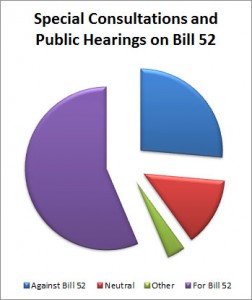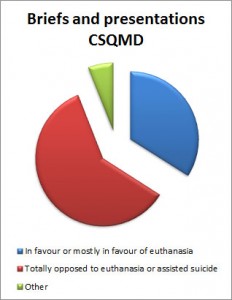Le Devoir reported Wednesday that the new prime minister of Quebec, Mr. Philippe Couillard, wants to quickly reintroduce Bill 52 on end-of-life care, which, according to him " is a rare example of consensus." What consensus is he talking about? There is no consensus within his party or among physicians. There is no consensus among people with disabilities. Nor is there unanimous agreement within the Quebec population. No consensus either among the groups that filed their briefs during the special consultations in 2013 or during the Special Commission in 2010.
No political consensus
Mr. Couillard does not seem to remember the division that existed within the Liberal caucus last fall, with respect to "medical aid in dying."More than half the Liberal MNAs voted against the adoption of the principle of Bill 52 on October 29, 2013. Twenty-five of the 49 Liberal MNAs were opposed to this bill.
No medical consensus
The College of Physicians of Quebec gives the impression that doctors support Bill 52, but the College did not consult its members before deciding to support the bill.
Physicians agree that we need to improve end of life care, through palliative care among other methods but many are opposed to "medical aid in dying," which is euthanasia disguised. More than 500 physicians in Quebec have joined the Physicians' Alliance against Euthanasia. These doctors work in the front lines of patient care and know the situation as it really is in the field. They are the first to say that "it would be a catastrophic mistake to legalize euthanasia in Quebec," as so aptly summarized by Dr. Balfour Mount, founder of palliative care in North America. Like Dr. Mount, 90% of palliative care specialists are opposed to the practice of "medical aid in dying".
No consensus among people with disabilities
People with disabilities are particularly vulnerable to the risks posed by Bill 52. Half of the four groups representing people with disabilities opposed legalization of "medical aid in dying". It is important to note that all major groups defending the rights of people with disabilities in North America oppose the legalization of euthanasia and assisted suicide.
No consensus within the population
One can only speak about unanimous agreement when people understand that they are talking about. However, an Ipsos poll in September 2013 found that 70 % of Quebecers do not understand that "medical aid in dying" means injecting a poison that causes rapid death.
Do not forget the thousands of citizens who expressed their opposition by signing the Manifesto of Living with Dignity or support the Physicians' Alliance against Euthanasia. In all, we are talking about more than 17 000 people. Can we seriously talk about consensus?
Even if the polls were to show broader popular agreement on this issue, the results of the recent elections shows that it is very risky to govern based on polls.
No consensus in the briefs
In 2010, 60% of submissions and oral presentations during the Special Committee on Dying with Dignity (CSQMD) were against euthanasia and assisted suicide. In 2013, there was no consensus either during the special consultations and public hearings on Bill 52 before the Committee on Health and Social Services (CHSS). In fact, 26% of submissions were against the bill and 17% refused to express an opinion on the issue of "medical aid in dying". In total, 45% of groups and people did not support "medical aid in dying".
These figures show that there is definitely no consensus to legalize euthanasia in Quebec! Mr. Couillard promises collaboration and unity. But a possible adoption of Bill 52 would lead to a deep division within his party, in the medical profession and in federal- provincial relations.
The real consensus
The only real consensus is around the need to improve care at the end of life. If the government insists on adopting a law on end of life care, and if they want to preserve the consensus while working in a spirit of cooperation and unity, they should table a bill to improve palliative care. Without including "medical aid in dying", of course.
ShareAPR
2014


